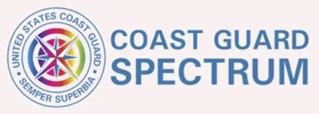What is Spectrum? 
Coast Guard Spectrum is an anti-racist, multicultural group for who are part of or support the LGBTQIAP+ (lesbian, gay, bisexual, transgender, questioning/queer, intersex, asexual, pansexual, and HIV-positive) community within the Coast Guard. Spectrum is led by their National Operating Committee of five members. There are 11 official chapters of Spectrum throughout the Coast Guard that aim to create a welcoming, supportive, and affirming workplaces where all people can thrive as their authentic selves.
Why do we need Spectrum?
CG leaders have reference guides for everything: Commanding Officer’s Quick Legal Reference Guide, the Military Assignments and Authorized Absences Commandant Instruction Manual, Boat Operator’s Handbooks, etc. Why? Because leaders can’t be all-knowing in all things. Many things in life are difficult to understand if you don’t experience them first-hand. And that’s fine. But that’s also why the Coast Guard has affinity groups like Spectrum — to share experiences and perspectives so that we grow our personal awareness.
Affinity groups like Spectrum play a vital role in creating inclusive environments where all are valued and empowered to succeed. Not only does Spectrum support the CG LGBTQIAP+ community, the group also supports leadership and commands. When we share experiences to better understanding each other’s perspective, we strengthen the teamwork needed for mission success and beyond towards innovation.
How Spectrum affects those outside the LGBTQIAP+ community
Lt. Cmdr. Angel Kwok, a member of Spectrum’s national committee, shared these thoughts. “I understand that [being queer] may not directly apply to you, but I am your shipmate, you’re my shipmate. And, as shipmates, we respect and care about each other.”
Spectrum aims to help people to learn about the queer community and create a welcoming environment where everybody feels safe to express themselves. Seeking to learn about and understand things you don’t understand — rather than ignoring or rejecting them — is the path to growth. For instance, if you’re unsure why pronouns (she/her, he/him, they/them) matter, or if you are unfamiliar with challenges members of the LGBTQIAP+ community face in the Coast Guard or in public, Spectrum can help you find out.
Why is inclusion critical?
The Coast Guard wants all members to feel safe, valued, and respected.
Kwok explains, “I served briefly under don't ask don't tell (DADT). I enlisted in 2008 and DADT was repealed in 2011. During that time, I hid and didn't say anything to anybody. Ever. Actually, I was really afraid because I was on a 110’ (cutter) with such a small crew. And we were out of Hawaii, so it's a small place too. I thought to myself, I’ll do my four years in the Coast Guard, and I'll get out. Then I can be a whole person again.” I kept to myself, which was very isolating. And we don’t want that for our new incoming members, or anyone, for that matter.”
How to be an Ally
Be curious. Be open. Be authentic. Being an ally doesn’t have to include grand gestures. In fact, subtle actions are often the most valued. Some people display small Pride flags near their office or cubicle. No words need be spoken to signify a safe place for LGBTQIAP+ members.
Cmdr. Kwok’s transfer to her current duty station, Activities Europe, got off to a great start due to a simple action her new executive officer (XO) took. “I received a Welcome to Activities Europe email from my new XO, in which the signature block contained the XO’s pronouns,” Kwok said.
Kwok continues, “Immediately after I received the email, I knew I had a supportive command and a barrier was completely removed. For such a small gesture, it was everything to me. I knew I could report in and immediately focus on the mission. It’s what the Coast Guard is all about. Right? Mission readiness.”
What's going on with Spectrum these days? What is Spectrum working on?
Cmdr. Kwok reports Spectrum is closely following several state anti-transgender and anti-transgender children bills prohibiting gender-affirming care and restricting use of public bathrooms. The spate of these bills has caused a great deal of concern for Coast Guards members in the LGBTQIAP+ community or those with children in the LGBTQIAP+ community. Spectrum is working hard to communicate these concerns to leadership and propose solutions.
So where do you see Spectrum in 20 years?
Spectrum is looking to other affinity groups, like the Women's Leadership initiative (WLI), to model their progress. Through coordination with the Coast Guard Alumni Association, WLI has 501(c)3 nonprofit status. This allows them to help fund travel and events like their large annual symposium, the Joint Women’s Leadership Symposium. Down the line, Spectrum is interested in similarly hosting an opportunity for in-person gatherings.
Note: In ALCOAST 208/23, the Coast Guard recognizes Lesbian, Gay, Bisexual, Transgender, Queer and others (LGBTQ+) Pride Month. It is an opportunity to recognize and celebrate the enduring devotion to duty of LGBTQ+ members of the Coast Guard workforce past and present. Internal unit Pride functions are authorized and encouraged. As with all externally sponsored events, if a member would like to participate in an externally sponsored Pride event in uniform, they should consult with their local servicing legal office first. The Coast Guard participates in and supports special observances throughout the year which are implemented by Presidential Proclamation, Executive Orders, Bills, or Public Laws.
In the News:
Coast Guard celebrates LGBTQ+ Pride Month on June 22 > United States Coast Guard > My Coast Guard News (uscg.mil)